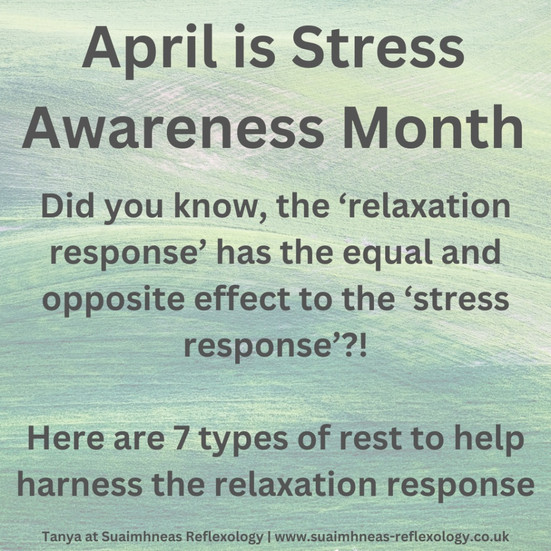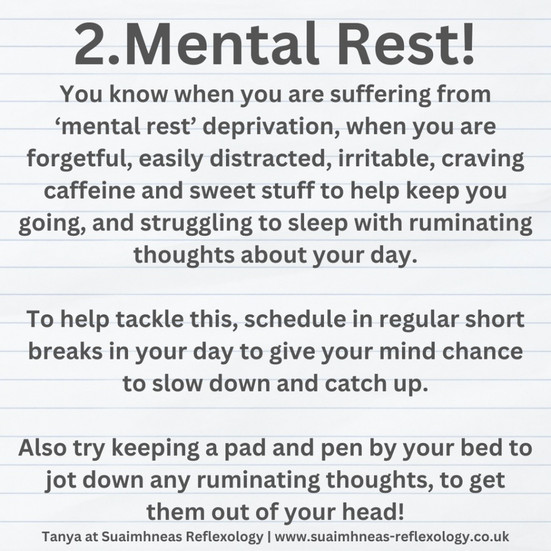The Stress-Response vs The Relaxation-Response!
- Tanya

- Apr 25
- 3 min read
April is Stress Awareness Month, and even though stress and poor mental health remain some of the biggest public health challenges of our time, it still feels like we’re not taking its impact seriously enough.
Many of you know my background in mental health, and that stress management—and maintaining a healthy work/life balance—is something I’m incredibly passionate about. There’s no shortage of advice out there on how to manage stress better, and if it’s something you're struggling with, please know I’m here to help.
But from a reflexologist’s perspective, one crucial piece often missing from the conversation is the importance of rest and relaxation.
You’ve probably heard me say it before (more than once!)—rest is THE most neglected part of our health and wellbeing. And to make it trickier, it's often confused or bundled in with sleep, which is only one part of the picture.
We talk about the importance of diet, exercise, and sleep all the time—but how often are we taught how to truly relax?
Interestingly, science is starting to catch up. Researchers are now talking about the counterpart to the well-known “stress-response,” which is aptly called the Relaxation-Response. And it’s just as powerful.
While stress raises your heart rate, blood pressure, glucose levels, and muscle tension, the Relaxation Response does the exact opposite. It slows your heart rate, lowers blood pressure, reduces inflammation and stress hormones, and promotes overall calm and clarity.
So, what does “rest” really mean? Sleep is vital—but if you’re still feeling exhausted despite getting enough hours, it might be that you're missing other types of rest. These can include:
Physical Rest (passive like sleep, or active like gentle stretching)
Mental Rest (quieting the mind)
Sensory Rest (reducing screen time and visual/auditory stimulation)
Creative Rest (reconnecting with beauty or inspiration)
Emotional Rest (allowing space to feel without judgment)
Social Rest (spending time with people who uplift you—or taking a break from those who don’t)
Spiritual Rest (connecting with something greater than yourself)
Each type of rest plays a unique role, and what restores one person might not work for another. But learning to tune into what you need is where the magic happens.
So how can reflexology help?
1. Calms the Nervous System
Reflexology gently encourages the body to shift from the sympathetic nervous system (fight-or-flight) into the parasympathetic nervous system (rest-and-digest). This helps the body slow down, allowing you to feel more grounded, centered, and calm.
2. Reduces Stress Hormones
By working on specific reflex points—particularly those linked to the adrenal glands, pituitary gland, and solar plexus—reflexology may help regulate the body’s production of stress-related hormones. This can lead to a greater sense of emotional balance and wellbeing.
3. Improves Sleep
One of the most common things clients share after a reflexology session is how well they sleep that night. Improved sleep is key to stress recovery, and reflexology helps by promoting relaxation and quieting the overactive mind.
4. Supports Circulation and Detoxification
A reflexology session also boosts blood and lymphatic flow, helping the body eliminate toxins and stress hormones more efficiently. It’s like giving your system a gentle internal cleanse.
5. Creates a Space for Stillness
In a world where we’re always "on," reflexology offers a rare opportunity to simply be. Many clients describe sessions as deeply meditative—helping them reconnect with their breath, their body, and their inner calm.
If you’re feeling the weight of stress in your body or mind, reflexology offers a gentle yet powerful way to bring yourself back into balance. At Suaimhneas Reflexology and Reiki, each session is tailored to support your individual needs, creating a space for deep rest, healing, and renewal.
Ready to give your nervous system a well-earned break?
Tanya x



















